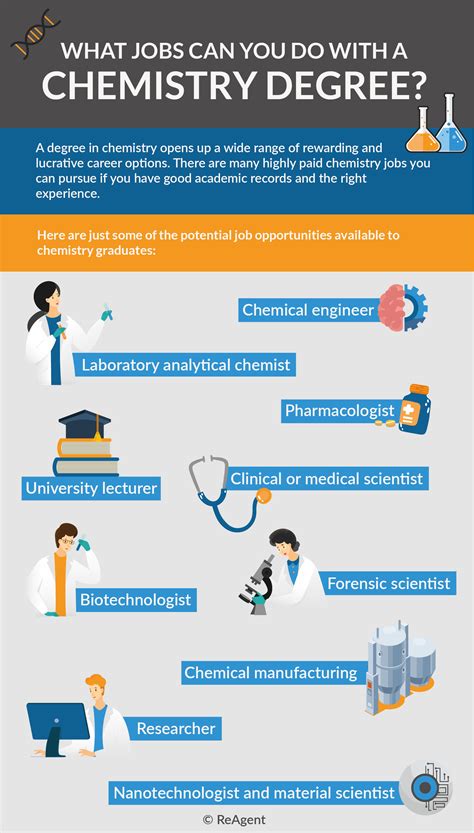With a chemistry degree, you’ll open doors to a vast array of rewarding and fulfilling careers. The field of chemistry is rapidly evolving, offering exciting new applications and innovations that drive industries and shape our world.

Lucrative Industries for Chemists
According to the U.S. Bureau of Labor Statistics, chemists earn a median annual salary of over $82,000, making it one of the most lucrative STEM professions. The demand for skilled chemists is growing across various industries, including:
- Pharmaceuticals
- Manufacturing
- Healthcare
- Energy
- Environmental Science
Diverse Career Options
A chemistry degree equips you with a versatile skillset that can be applied to a wide range of careers. Some of the most common job titles for chemists include:
- Research Chemist: Conducts experiments and analyzes data to develop new products, materials, and processes.
- Analytical Chemist: Uses chemical techniques to identify and quantify substances in various samples.
- Medicinal Chemist: Designs and synthesizes new drugs to treat diseases.
- Environmental Chemist: Monitors and analyzes environmental pollutants to protect human health and ecosystems.
- Forensic Chemist: Applies chemistry to investigate crimes and provide evidence in court.
Specialized Roles
In addition to these traditional roles, chemistry graduates can also pursue specialized fields such as:
- Nanotechnology: Develops and studies materials at the atomic and molecular level, with applications in electronics, medicine, and energy.
- Biochemistry: Combines chemistry with biology to understand the molecular processes in living organisms.
- Materials Science: Creates and tests new materials with tailored properties for use in various industries.
- Chemical Engineering: Designs, builds, and operates chemical plants and processes for efficient production.
Emerging Applications
As the field of chemistry continues to advance, new and innovative applications are emerging, creating exciting opportunities for graduates. These include:
- Green Chemistry: Develops sustainable chemical processes and technologies to reduce environmental impact.
- Computational Chemistry: Uses computer simulations to model and predict chemical reactions.
- Pharmacognosy: Studies the discovery, isolation, and production of medicinal compounds from plants and other natural sources.
Career-Boosting Tips
- Pursue advanced degrees: A master’s or Ph.D. degree can enhance your qualifications and open up leadership roles.
- Gain practical experience: Internships, research projects, and industry certifications provide valuable hands-on experience.
- Stay updated on current research: Attend conferences, read scientific journals, and engage in professional development activities.
- Develop strong communication and problem-solving skills: Effectively convey technical information and navigate complex scientific challenges.
Sample Career Paths
Example 1:
- Research Assistant in Pharmaceutical Company
- Medicinal Chemist
- Lead Scientist in Drug Development
Example 2:
- Analytical Chemist in Environmental Laboratory
- Environmental Consultant
- Director of Environmental Sustainability
Example 3:
- Research Engineer in Materials Science
- Product Development Manager in Chemical Industry
- Nanotechnology Specialist in Electronics Manufacturing
Conclusion
A chemistry degree opens the door to a world of opportunities in diverse industries. With its emphasis on analytical thinking, problem-solving, and innovation, this versatile degree prepares graduates for a wide range of rewarding and lucrative careers. By staying informed about current advances and embracing specialized fields, chemists can make significant contributions to scientific discovery, technological innovation, and the well-being of our planet.
Tables
Table 1: Top Industries for Chemists
| Industry | Median Annual Salary |
|---|---|
| Pharmaceuticals | $101,200 |
| Manufacturing | $95,000 |
| Healthcare | $92,000 |
| Energy | $89,000 |
| Environmental Science | $87,000 |
Table 2: Common Job Titles for Chemists
| Job Title | Description |
|---|---|
| Research Chemist | Conducts experiments and analyzes data to develop new products, materials, and processes. |
| Analytical Chemist | Uses chemical techniques to identify and quantify substances in various samples. |
| Medicinal Chemist | Designs and synthesizes new drugs to treat diseases. |
| Environmental Chemist | Monitors and analyzes environmental pollutants to protect human health and ecosystems. |
| Forensic Chemist | Applies chemistry to investigate crimes and provide evidence in court. |
Table 3: Specialized Roles for Chemists
| Role | Description |
|---|---|
| Nanotechnologist | Develops and studies materials at the atomic and molecular level. |
| Biochemist | Combines chemistry with biology to understand the molecular processes in living organisms. |
| Materials Scientist | Creates and tests new materials with tailored properties. |
| Chemical Engineer | Designs, builds, and operates chemical plants and processes. |
Table 4: Emerging Applications of Chemistry
| Application | Description |
|---|---|
| Green Chemistry | Develops sustainable chemical processes and technologies. |
| Computational Chemistry | Uses computer simulations to model and predict chemical reactions. |
| Pharmacognosy | Studies the discovery, isolation, and production of medicinal compounds from natural sources. |
